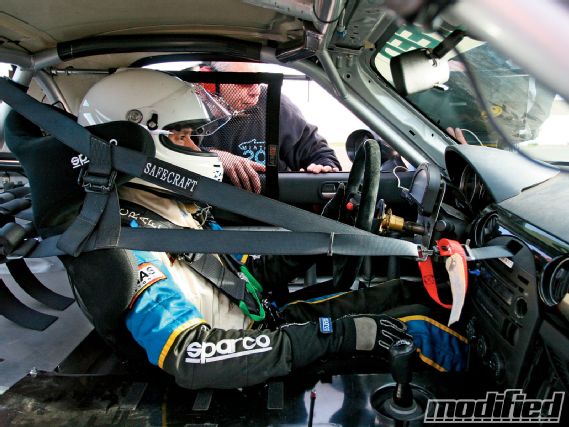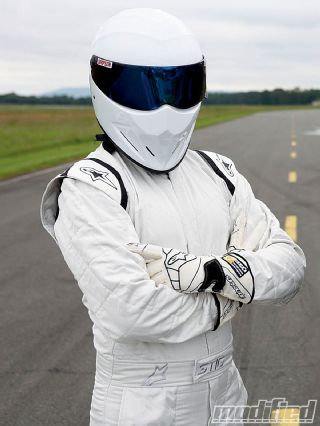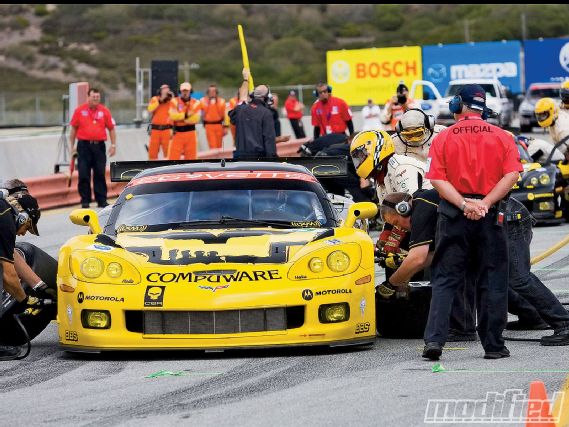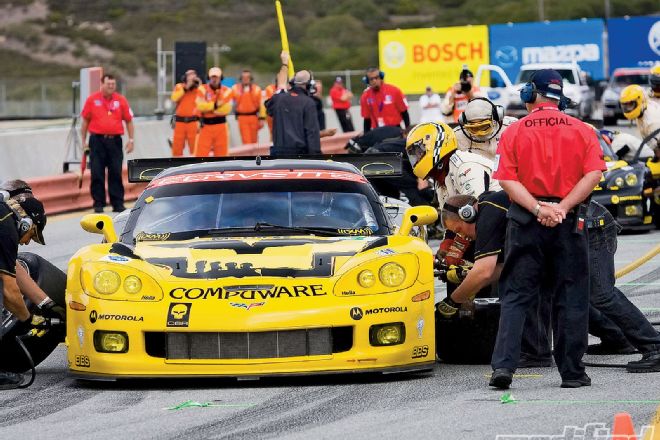While reviewing some in-car video footage with Modified's intrepid leader (Editor in Chief Peter Tarach) behind the wheel of Project DC2 at the Super Lap Battle finals, what started out as a pretty straightforward discussion about braking points and chassis setup took an unexpected change in direction. Instead of blathering on about trying a later apex or stiffer rear sway bar, our conversation spun off into the murky waters of human emotion and the psychology of high-performance driving. It's all well and good to look to your equipment (the car, the tires, etc.) or driving technique (from a physical/biomechanical perspective) as a way of finding more speed, but there's also a lot of untapped speed to be found by looking inward and strengthening your mental approach behind the wheel.
 |
Having a relaxed and focused state of mind as you jump into the cockpit is critical. Having a plan of attack before exiting pit lane is also invaluable, since this will help you focus on the task at hand.
|
Having a relaxed and focused state of mind as you jump into the cockpit is critical. Having a plan of attack before exiting pit lane is also invaluable, since this will help you focus on the task at hand.
As Ross Bentley put it in his excellent book Speed Secrets: Professional Race Driving Techniques, "Your mental approach to driving may just have the single biggest effect on your success." Although I'm sure we're all aware that emotions like fear and confidence, as well as the ability to mentally focus on the task at hand, play a huge role when pursuing peak performance, it may come as a bit of a surprise to some of you that the psychology of racing and mental preparation for high-performance driving isn't often a part of the curriculum at racing schools (and I've been to most of the well-known ones in North America). Why is that? Probably because most students still need a lot of help with the mechanics of racing, stuff like heel-and-toe downshifting, threshold braking and identifying the racing line, so tackling a more complicated and advanced subject like the mental approach to driving tends to be left out.
The first time I had my eyes opened to the mental side of racing was at a local autocross event, when riding shotgun with one of the fastest guys in the region. It was only a practice run, but he still went through his pre-run routine like it was his last timed run of the day. Rather than rocking out to the radio or chatting with friends before each run, this guy sat quietly in the driver seat with his helmet on and visualized every twist and turn of the course. His head leaned left and right and his hands grasped an imaginary steering wheel that he turned as his mind raced through the course. He even simulated shifting and his footwork on the pedals.
 |
Unless you're a mindless driving machine like The Stig, improved mental preparation will help you unlock newfound speed.
|
Unless you're a mindless driving machine like The Stig, improved mental preparation will help you unlock newfound speed.
I thought race driving was just about talent and courage (he who has the biggest "attachments" wins!), so I had to hold back a snicker as I watched him visualize the course, but as we slid into the stop box at the end of the run, I knew there had to be something to it. His line was so precise and his preservation of momentum so effortless, it was like he'd designed the course and run it 10 times in practice, yet it was only his second run of the day. So while staging before each run for the rest of the event, I closed my eyes and visualized myself driving the course, shifting quickly and smoothly, steering with precision and attacking each corner with confidence. I'd never finished better than third in class before, but this time I won my class comfortably in an underprepared car on all-season tires. I drove home wondering if I could kill a goat just by staring at it (no luck so far, but a drunk chick once told me I look like George Clooney).
Fast-forward a few years, and I'm struggling to beat a couple of first-gen Eagle Talons in my class in a regional time attack series. My car (a BB6 Honda Prelude) was well prepped, but I'd convinced myself there was no way it could go flat out around turn 1, a deceivingly quick right-hander with some camber to it. It was the last event of the year and I was desperate for a win, so after a lot of deep breathing and a scream of "banzai!" as I blasted down the front straight toward turn 1, I kept the throttle matted. Much to my brain's surprise, the car gripped strongly through the apex and gained enough exit speed that an extra upshift was needed before the next braking zone. Breaking through this mental barrier not only led to my first class victory in a time attack series, it made me realize just how big a factor my mindset is when driving and how learning to control my emotions and focus my mind would be key to any future successes I might have behind the wheel.
 |
Pros like three-time Le Mans winner Ron Fellows have found consultation with sports psychologists like Dr. Jacques Dellaire extremely helpful, so don't be afraid to look inward when searching for ways to go faster on the racetrack.
|
Pros like three-time Le Mans winner Ron Fellows have found consultation with sports psychologists like Dr. Jacques Dellaire extremely helpful, so don't be afraid to look inward when searching for ways to go faster on the racetrack.
But it's not just grassroots racers like you and me who benefit from mental preparation before a race. Many of the world's most accomplished racing drivers have consulted with sports psychologists as a way of fine-tuning their mental approach to driving. I recently became aware of this when talking with Ron Fellows (a three-time winner at the 24 Hours of Le Mans for Corvette Racing) while attending his Corvette high-performance driving school at Spring Mountain Motorsports Ranch. Ron explained how he's worked closely with Dr. Jacques Dellaire, a world-renowned expert on the subject of racing driver performance (from both a physiological and psychological perspective) and who's worked with drivers at every level of the sport from F1 all the way down to club racers.
Normally it would be very expensive to access the expertise of someone like Dr. Dellaire, but thanks to his affordable and internet downloadable 95-minute audio session called "Mental Skills for Competition...and for Life," you can get a taste of what it's like to sit on his sofa and have him give your brain a tune-up. Although some of this audio session struck me as motivational rather than psychological, I found parts to be incredibly insightful and useful when preparing myself for a race. Since your mental approach to driving is no doubt different than mine, you may find other parts of the CD valuable that I did not. Point being, if you approach a product like Dr. Dellaire's CD with an open mind, you can potentially get a lot out of it, especially if you haven't really given your mental approach to driving much thought before.
 |
We all have our own unique psychological makeup, so be prepared to try different methods of mental preparation to find the ones that work best for you.
|
We all have our own unique psychological makeup, so be prepared to try different methods of mental preparation to find the ones that work best for you.
If this type of inward reflection isn't really your cup of tea, there are other more grounded ways to refine your mental approach to driving. Ross Bentley's aforementioned book Speed Secrets has a short but insightful chapter (Chapter 14: A Racing Mind) that outlines a variety of "secrets" related to optimizing your mental approach to race driving. Getting into the car with a relaxed and focused mind, focusing on your own performance rather than on the competition's, focusing your eyes on where you want to go on the track (not where you don't want to go), looking and thinking as far ahead as possible, expanding your comfort zone (or feeling more comfortable at full speed and on the edge of adhesion) through practice and experience, and learning to use visualization to focus your mind are all practical suggestions discussed by Bentley and ones I know have helped my own on-track performances over the years.
If you're anything like me, then half the battle is simply recognizing the importance of your state of mind when getting into your car and your mental preparation before attempting to win the race or set a personal best lap time. With this recognition comes the opportunity to fine-tune the most important part of your race car, the driver. As the old saying goes, there's no substitute for seat time, but through visualization and better mental preparation you will make the most of that seat time and leapfrog your closest competitors in the process.

